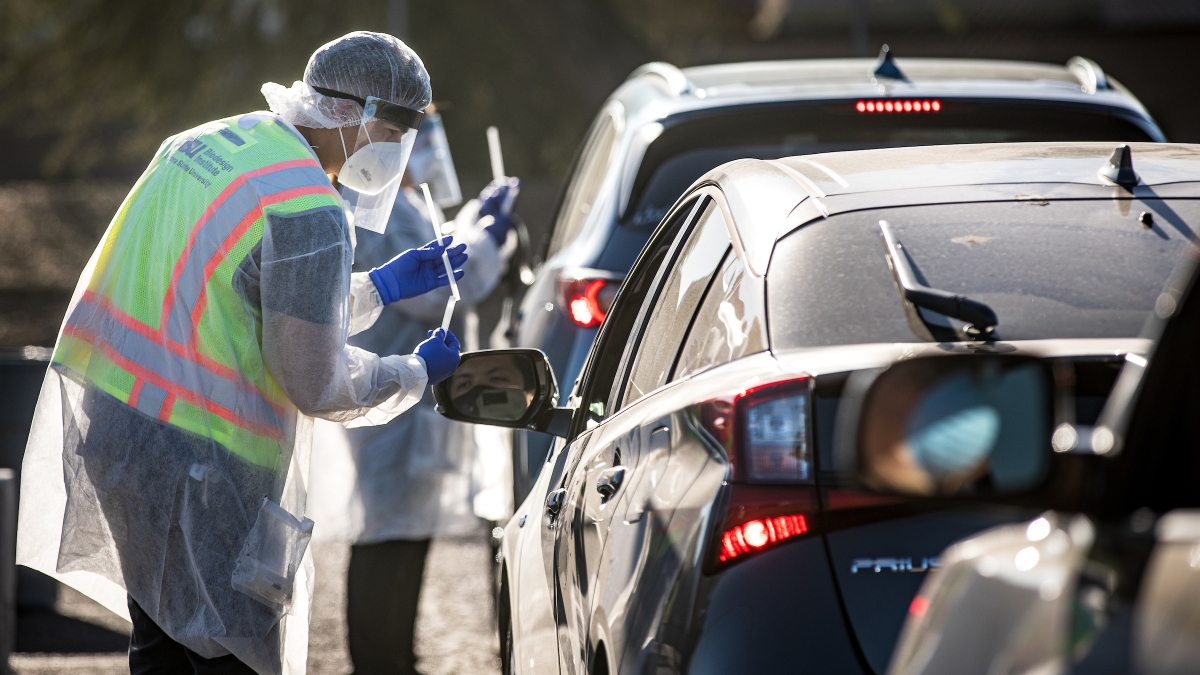Arizona’s Mohave County is experiencing long wait times for COVID-19 test results, but ASU at Lake Havasu is helping to relieve some of the bottleneck.
The university is teaming up with Lake Havasu City and the Arizona National Guard to offer free saliva-based diagnostic testing, event staffing and a drive-thru site location to residents of Mohave County and Lake Havasu City at large.
“ASU at Lake Havasu is proud to partner with Mayor Cal Sheehy, Lake Havasu City and the ASU Biodesign Institute to bring additional COVID testing options to the western region of Arizona,” said Carla J. Harcleroad, director of ASU at Lake Havasu. “This is an example of ASU’s commitment to the communities we serve.”
The event is slated for Friday, Oct. 2, at the Lake Havasu City Aquatic and Community Center located at 100 Park Ave. Event hours will run from 8 a.m. to 1 p.m., and test results are usually delivered within 24–48 hours. The Arizona National Guard Medical Division will provide five staff members to administer the tests. Preregistration is required, and the agency code for scheduling is SALIVATEST.
Sheehy said the current typical wait time for COVID-19 test results in the Lake Havasu City area is about 7-10 days, and he felt that was too long.
“Test results were taking a considerable amount of time, and the city was looking for additional options for our community. That’s when this opportunity with ASU presented itself,” said Sheehy, who has partnered with ASU at Lake Havasu on many community-related issues such as the environment, sustainability, volunteer work and fundraising. This is central to ASU’s Charter commitment to be fundamentally responsible for the economic, social, cultural and overall health of the communities it serves.
The saliva-based diagnostic testing was conceived by ASU’s Biodesign Institute and designed with an eye for speed, scale and convenience. The testing process usually takes about 10–20 minutes and participants don’t even have to leave their vehicles.
“The process is easy and painless,” said David Thomas, CEO of ASURE, who works with the team providing public testing for ASU. “When you arrive at the site you get a sample tube, find a comfortable parking space to collect the sample, hand off the tube on the way out, and go about your day.”
The Biodesign Institute announced in May that it had developed the first saliva-based COVID-19 test for front-line health care workers, critical infrastructure and public safety personnel. Since then they have hosted several events throughout the state through a partnership with the Arizona Department of Health Services. ASU has also been using the saliva-based test with employees and students. To date, more than 36,000 Arizonans have received testing free of charge through ASU/state of Arizona partner testing sites.
In addition to the Phoenix area, ASU has hosted testing in Tucson, Flagstaff, Winkleman, Safford, Parker and Salome. The university also has plans to visit Nogales and Rio Rico in mid-October.
Top photo: Throughout the course of the pandemic, ASU's Biodesign Institute has played a major role in tracking COVID-19. Now, the university has developed a free saliva-based diagnostic test for Arizona communities.
More Science and technology

Applied Materials invests in ASU to advance technology for a brighter future
For nearly 60 years, global giant Applied Materials has been hard at work engineering technology that continues to change how microchips are made.Their products power everything from flat-panel…

Meet ASU engineering students who are improving health care, computing and more
Furthering knowledge of water resource management, increasing the efficiency of manufacturing point-of-care health diagnostic tools and exploring new uses for emerging computer memory are just some…

Turning up the light: Plants, semiconductors and fuel production
What can plants and semiconductors teach us about fuel production?ASU's Gary Moore hopes to find out.With the aim of learning how to create viable alternatives to fossil-based fuels, Moore — an…


